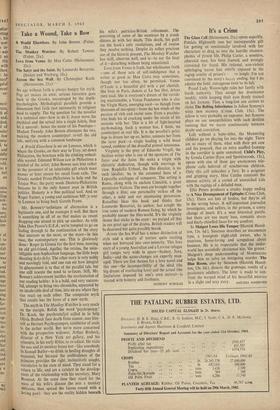It's a Crime
The Glass Cell (Heinemann, 21s.) opens superbly. Patricia Highsmith uses her incomparable gift
for getting us emotionally involved with her characters to drag us into the horrific claustro- phobia of prison life. Philip Carter, a sensitive, educated man, has been framed, and wrongly convicted for fraud. His rational, non-violent upbringing leaves him utterly exposed to the raging cruelty of prison's :us jungle. I'm not convinced by the story's happy ending, but I do admire the bold, outrageous twist to its tail. Proud Lady Wainwright rules her family with harsh authority. They accept her dominance meekly, while keeping their eyes firmly trained on her fortune. Then a long-lost son arrives to
claim The Belting Inheritance in Julian Symons's witty new mystery (Crime Club, 15s.). The
fellow is very probably an impostor, but Symons plays on our susceptibilities with such devilish cunning that we waver continuously between doubt and conviction.
Left without a baby-sitter, the Mannering children go on playing far into the night. There are so many of them, what with their pet cow
and the peacock, that an extra muffled footstep in the corridor is quite unnoticed. Child's Play,
by Ursula Curtiss (Eyre and Spottiswoode, 15s.), opens with one of those gay anonymous tele- phone calls beloved of mischievous children.
Only this call unleashes a fury. In a poignant and gripping story, Miss Curtiss contrasts the intense activity of a crowd of unwatched kids with the ragings of a deluded man.
Ellis Peters produces a creaky happy ending to A Nice Derangement of Epitaphs (Crime Club,
15s.). There are lots of bodies, but they're all in the wrong boxes. A self-important journalist investigates, and suffers, in the process, a corny change of heart. It's a neat historical puzzle, but there are too many lean, romantic stares and finely-chiselled faces for my comfort.
• In Maigret Loses His Temper (Hamish Hamil- ton, 13s. 6d.), Simenon describes an uncommon
type, a bourgeois night-club owner, who is uxorious, home-loving and scrupulous about business. He is so respectable that the under- world has scornfully christened him 'the grocer.'
Maigret's deep understanding of Montmartre helps him to solve an intriguing murder. The Blue Room, also by Simenon (Hamish Hamil-
ton, 13s. 6d.), dissects the grotesque results of a passionate adultery. The loiter is made to con- front the warped mind of his beautiful mistress


































 Previous page
Previous page